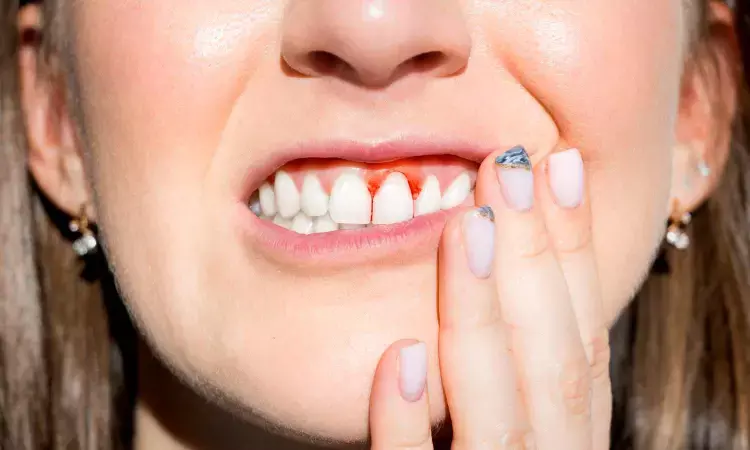- Home
- Medical news & Guidelines
- Anesthesiology
- Cardiology and CTVS
- Critical Care
- Dentistry
- Dermatology
- Diabetes and Endocrinology
- ENT
- Gastroenterology
- Medicine
- Nephrology
- Neurology
- Obstretics-Gynaecology
- Oncology
- Ophthalmology
- Orthopaedics
- Pediatrics-Neonatology
- Psychiatry
- Pulmonology
- Radiology
- Surgery
- Urology
- Laboratory Medicine
- Diet
- Nursing
- Paramedical
- Physiotherapy
- Health news
- Fact Check
- Bone Health Fact Check
- Brain Health Fact Check
- Cancer Related Fact Check
- Child Care Fact Check
- Dental and oral health fact check
- Diabetes and metabolic health fact check
- Diet and Nutrition Fact Check
- Eye and ENT Care Fact Check
- Fitness fact check
- Gut health fact check
- Heart health fact check
- Kidney health fact check
- Medical education fact check
- Men's health fact check
- Respiratory fact check
- Skin and hair care fact check
- Vaccine and Immunization fact check
- Women's health fact check
- AYUSH
- State News
- Andaman and Nicobar Islands
- Andhra Pradesh
- Arunachal Pradesh
- Assam
- Bihar
- Chandigarh
- Chattisgarh
- Dadra and Nagar Haveli
- Daman and Diu
- Delhi
- Goa
- Gujarat
- Haryana
- Himachal Pradesh
- Jammu & Kashmir
- Jharkhand
- Karnataka
- Kerala
- Ladakh
- Lakshadweep
- Madhya Pradesh
- Maharashtra
- Manipur
- Meghalaya
- Mizoram
- Nagaland
- Odisha
- Puducherry
- Punjab
- Rajasthan
- Sikkim
- Tamil Nadu
- Telangana
- Tripura
- Uttar Pradesh
- Uttrakhand
- West Bengal
- Medical Education
- Industry
Why patients with gum disease are less likely to respond to RA treatment?

USA: A recent study suggests that breaches in damaged gums allow bacteria in the mouth to seep into the bloodstream, activating an immune response that ultimately pivots to target the body’s own proteins and causes arthritis flare-ups.
It’s a well-documented medical mystery: Patients with gum disease are less likely to respond to rheumatoid arthritis treatments. But the new research published in Science Translational Medicine has explained this link between gum disease and an otherwise disparate condition.
The study revealed a plausible mechanism to explain why rheumatoid arthritis patients with periodontal disease do not respond well to treatment-something very hard to capture without long-term monitoring.
“If oral bacteria are getting in and repeatedly triggering immune responses relevant to rheumatoid arthritis, that could make it harder to treat,” says Dana Orange, a professor of clinical investigation in the laboratory of Robert B. Darnell at Rockefeller University. “When doctors encounter arthritis patients who do not respond to treatment, it would be worth ensuring they aren’t missing an underlying gum disease, which is quite treatable.”
The Darnell lab had been following a small group of arthritis patients over the course of several years, collecting weekly blood samples and looking for changes in gene expression to help explain why painful flare-ups occurred when they noticed a surprising trend. Two of their patients, who had moderate to severe periodontal disease, had repeated episodes of oral bacteria in their bloodstreams, even when they didn’t have dental work.
Orange knew that rheumatoid arthritis patients generally have autoantibodies in their bloodstream (rheumatoid arthritis is an auto-immune disease, wherein antibodies attack the body’s own proteins and peptides). In many cases, autoantibodies take specific aim at proteins bearing the signs of citrullination, a process by which one amino acid in the protein is converted into a different one.
Upon further examination, the team discovered that the oral bacteria they detected in the blood are also citrullinated in the mouth, much like the proteins targeted by autoantibodies in arthritis. They then demonstrated that the same autoantibodies that take potshots at the body’s citrullinated proteins activate in response to citrullinated bacteria.
The results may explain why arthritis treatments do not work as well in patients with gum disease. If the gums continuously release immune triggers into the bloodstream, treating arthritis without first solving the periodontal problem is like trying to haul water out of a ship without first plugging up its leaks.
“Gum disease is quite curable; rheumatoid arthritis can be much more difficult to treat,” Orange says. “Our results indicate that periodontal disease leads to leaky gums that allow oral bacteria to enter the blood repeatedly. This level of oral bacteria in the blood doesn’t cause obvious symptoms, so the patients were unaware of this. Still, they trigger inflammatory and auto-antibody responses highly relevant to rheumatoid arthritis.”
These findings also demonstrate long-term research's importance in understanding chronic diseases better. The present study would not have been possible without a unique initiative, pioneered by Orange and Darnell several years ago, that empowers arthritis patients to collect their own blood samples at home with a finger-prick kit and mail weekly samples to Rockefeller. The lab has several years of data to help track what happens in the blood right before an arthritis flare.
“Without having weekly blood samples for at least a year, we wouldn’t have been able to find out what was happening before the patients had symptoms of their flares,” Orange says. “Our study revealed a plausible mechanism to explain why rheumatoid arthritis patients with periodontal disease do not respond well to treatment-something, very hard to capture without long-term monitoring.”
Reference:
R. Camille Brewer et al. ,Oral mucosal breaks trigger anti-citrullinated bacterial and human protein antibody responses in rheumatoid arthritis.Sci. Transl. Med.15, eabq8476(2023).DOI:10.1126/scitranslmed.abq8476.
Dr Kamal Kant Kohli-MBBS, DTCD- a chest specialist with more than 30 years of practice and a flair for writing clinical articles, Dr Kamal Kant Kohli joined Medical Dialogues as a Chief Editor of Medical News. Besides writing articles, as an editor, he proofreads and verifies all the medical content published on Medical Dialogues including those coming from journals, studies,medical conferences,guidelines etc. Email: drkohli@medicaldialogues.in. Contact no. 011-43720751


